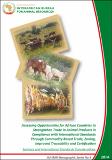
Book/Monograph
ASSESSING OPPORTUNITIES FOR AFRICAN COUNTRIES TO STRENGHTHEN TRADE IN ANIMAL PRODUCTS IN COMPLIANCE WITH INTERNATIONAL STANDARDS THROUGH COMMODITY BASED TRADE, ZONING, IMPROVED TRACEABILITY AND CERTIFICATION
Attachments [ 1 ]
More Details
Countries in sub Saharan Africa (SSA) who do not yet have the advantage of OIE recognized free zones or status for animal diseases are currently experiencing a comparative disadvantage for entering international trade in animals and animal products. With boneless beef making up approximately 84% of total trade in beef and an increase in value in parallel with total beef and edible offal trade of 11% per annum, a vast potential market is in the waiting for countries in SSA to contribute to the worldwide demand that should and must be exploited (13). Without being able to comply with the strict sanitary guarantees required by trade partners especially in the developed world, these potential markets remain closed for the majority of SSA countries. Most countries in SSA where trade sensitive animal diseases are endemic do not have the ability, infrastructure and political support to establish and maintain disease free zones. There are also other constraints unique to Africa such as the wildlife-livestock interface, the permanent presence of the FMDV in the African buffalo cultural entities and transhumance that further place constraints on these countries to comply with international standards for market access….
Comments
(Leave your comments here about this item.)